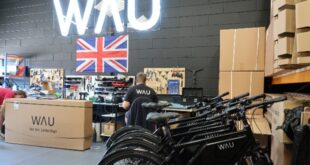Interview with Joel Teague, founding Director of WJ Clothing whose brand Whackjob has been making a name for itself in the UK MTB world since forming in 2011. WhackJob is available to bike shops in the UK.
First of all, what inspired you to seek out fairly traded sources?
I lived in Whistler for a couple of years and learned there that ethical supply routes are just part of a wider way of doing business that can and does work. If you deal with good people the trust is higher, the opportunities for collaboration increase and you spend less time squabbling and minding your back. That lets you put more resources into what matters, which is the product. It’s also a big part of an innovative and caring culture, which is what we’re all about. If you conform to the way everyone else thinks about supply lines, you’ll generally find yourself conforming on what comes through them. Just compare a conventional jersey from the nineties to one from today and try to find what’s really moved on in that time.
Yous suppliers are also Soil Association registered – what’s involved with this?
The up-side of using accredited supply lines is that the effort and expense of accreditation is shared across all users of those lines. We do not have to go through that process; the cost and time is borne by the suppliers, spread across their customers (i.e. us) and we all benefit. So in the case of Soil Association, you know that at the end of that supply line there is a farmer who sells more goods at a higher value because he’s put the effort in to keep his land clear of chemicals for seven years. The Soil Association are very respected and trusted, which is what you look for in an accreditation scheme. The same applies to Oeko Tex, which we appreciate is a reliable way to know there’s been nothing chemically nasty used along the manufacturing chain, and The Fair Wear Foundation which ensures everyone who worked on the products has been looked after and has the same rights that we’d all rightfully expect.
Was it a difficult process finding a manufacturer to work with as a Fairwear partner?
No, but getting that accreditation is not easy and so choices are still limited. Right now we’re trying to use our leverage to encourage other supply lines to go for accreditation. It’s only through directing spend to those who ‘walk the walk’ that you can really bring about the change. It’s no good waiting for legislation. It’s all about making it financially viable for people, and that often means very painful decisions and a certain level of brinkmanship. At the end of the day, the aim has to be that these standards are the norm, not the exception, and if we don’t bring that about, who will?
What benefits does your commitment offer the workers producing your goods?
Buying something with Fair Wear accreditation means that you can be confident that everyone who worked on that product, regardless of their location on the planet, has the same basic rights that you’d get in the UK. Globally, things have improved a great deal, but there’s still a lot that unfortunately goes on that would soon change peoples’ buying habits if they saw it for themselves.
We know though that the people who grew our bamboo, made it into yarn, then garments and so on are all of what we would consider a working age, all chose their jobs freely, get paid a decent living wage for reasonable hours, have all the rights that we enjoy and work in an environment that you and I would find acceptable. Fair Wear aren’t the only people enforcing this kind of approach, but right now they are the ones we trust the most to really keep our suppliers in line.
Why do you think more cycling companies don’t make such a commitment? Is the associated cost to the business a substantial one?
In terms of cycle clothing there’s a lot that has to change and much of that comes down to what most cycling clothes are made of. This is why we ended up with bamboo; we looked at conventional ‘tech’ materials, and at the end of the day they are all made of plastic (primarily nylon or polyester derivatives) and that is made of oil. Manufacturing in these materials often comes from places that don’t have the best records in terms of ethics and ecology, although that is all improving. Woven and natural yarns have suffered from this too, but these ethical lines do exist. Perhaps this is because there are farmers at the end of the chains rather than Big Oil – I don’t know.
In terms of cost, well – it’s a pretty big commitment, especially when you’re starting up. The time alone in finding appropriate products and supply lines can be many times more than if you turn a blind eye, and all that accreditation and auditing costs money. This is one reason why our balance of costs is very different from mainstream products. By this we mean that we spend more on the product and less on marketing. That means we rely on customer advocacy to build awareness and thankfully that’s working.
It’s frustrating when you see comparisons in magazines between what are basically the same product from the same factories at huge prices, and you know how little of that price was spent on the actual item. It speaks volumes that one publication recently gave four out of five stars to a jersey from a budget supermarket. It costs £4.99. Take off the cost of transport and selling it, and you get some idea of what these types of product actually cost to make and how much of the customer’s money is spent on selling it to them in the first place. Our model is the other way around which is why our customer advocacy and loyalty is so strong – but we have to be more patient in gaining those customers in the first place.
We’ve done our research though, and we know that when it comes to mountain bikers, people are not daft enough to just take what is offered to them. Most simply don’t ride wearing mountain bike clothing. If you don’t believe that, just go to a trail centre and count. We did, many times over.
We’re offering something that actually does what people want it to do rather than what’s cheap and easy to make – and we’re steadily winning people over. At the end of the day, if you’d just invented mountain biking and were deciding what was best to wear while doing it, I’m pretty sure you wouldn’t put plastics very high up the list. We’re just putting a better alternative out there and waiting for a few decades of conventional thinking to give way to common sense – and it’s working. The fact that doing it involves one of the most ethical materials on the planet is a huge bonus.
What kind of energy/raw material savings are you making by producing Whackjob garments in an eco-concious way?
Very little at our end; it’s all further up the chain. Renewable energy contracts (we use Good Energy – brilliant lot) help, but it’s all about what happens while our stuff is on its way from a bamboo plantation to our shelves. Bamboo is the fastest-growing plant out there and sucks up CO2 at a huge rate. Everything is transported over land and water to keep emissions down, and we know that we’re not contributing to the enormous quantity of nasty stuff that gets tipped into rivers and seas every day from unethical processing, dyeing and printing. The net beneficial impact of a company doing things the way we do is huge; it’s just not something you can see right in front of you so too many people don’t bother. All it really comes down to is good old fashioned ethics in the people making the decisions. We’ll get there.
To read more on bike industry companies with fair trade links and their thoughts on the commitments needed to manufacture in this way, see here.
 BikeBiz Bicycle and cycling retail news
BikeBiz Bicycle and cycling retail news



